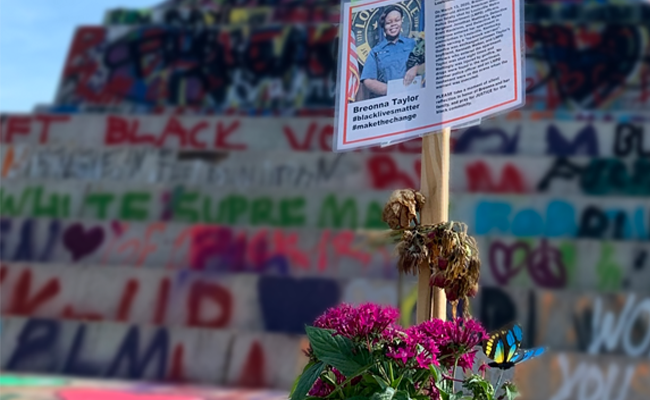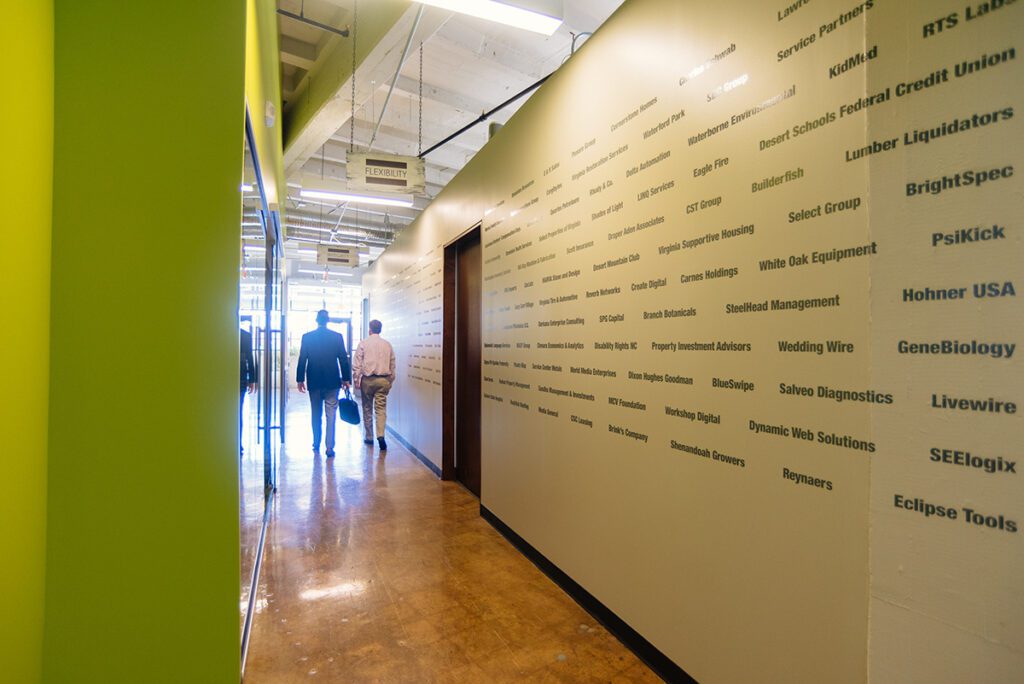(Video) Grant Gamble of Blue Oceans Addresses VACEOs Members

Grant Gamble to present “Red Oceans, Blue Zones and You: Simple strategies for leaders to care for self and others during turbulent times and always” on July 29, 2020, 10:15 AM-11:30 AM.
This event is for VA Council of CEOs Members and Sponsors only.
The business environment is roiling; stress is at an all-time high; and yet some leaders seem to swim those troubled waters with equanimity and ease.
After 35 plus years as a leader and senior executive in the healthcare, fitness, and wellness industries, I have learned one indisputable truth: one size does not fit all when it comes to a healthy lifestyle and self-care.
What works for one person may not work for another.
This is not another exercise more and eat less lecture.
It is a simple set of lifestyle options for leaders that can enhance the quality of your life, your leadership, and positively impact those around you.
I will take you through a series of unique learnings from my personal journey through the wellness and healthcare community and groundbreaking research that has definitively illustrated simple ways to incorporate taking better care of yourself into your daily routine, without adding a bunch of things onto your daily To-Do List.
In turn, the simple changes you incorporate into your self-care will positively influence those people you care about within your family and community.
If you’ve ever struggled to maintain an exercise program or incorporate the latest diet into your life, this is the session for you. No rigorous exercise routines, unrealistic diets, or magic pills. Just simple ways to transition your lifestyle from struggle, frustration, and guilt to seamless integration into your every day.”
Grant Gamble
Speaker, Author, Coach
GrantIanGamble.com

Grant is a business growth consultant, author and keynote speaker. He works in a broad array of industries helping companies build teams, navigate change and drive growth. Learn more.
“Grant’s towering strength is his ability to walk the line between providing top-notch executive leadership, and rolling up his sleeves and working very hands on with frontline employees. Grant can lead top-down from the C-suite with his intellect, or from the ground up with his work ethic and teamwork. Grant is a natural leader.” – Tom Perrin, PhD CEO & Executive Coach, Perrin & Associates.
From the Desk of Scot McRoberts: There Were Seven of Us
There were seven of us, owners and CEOs of small businesses, opening up about our uncertainty. None of us had ever led through such a charged and chaotic time.
We met, via Zoom of course, to discuss “Leadership, Values, and Racial Justice”. It was June 16, just eighteen days after the death of George Floyd while in police custody sparked protests and riots in every major U.S. city. Most of us were in Richmond, Virginia where rioters had vandalized and looted stores downtown and protesters soon focused on the city’s prominent Confederate monuments with graffiti, marches and voices.
These seven leaders shared a common sense of uncertainty, but also a sense opportunity. What followed was an open, confidential discussion. It was powerful in that the CEOs in the “room” were determined to step up as leaders and embrace the future.
I cannot share the private conversation we had, but I can share a few things we learned from one another that could be helpful to other leaders.
#1) THERE HAS BEEN A SHIFT IN WHAT IS EXPECTED OF BUSINESSES IN AMERICA
It has always been a fact that corporations served their shareholders first. Last summer Business Roundtable issued a seismic statement on “The Purpose of a Corporation”. These 181 CEOs of America’s largest companies set new expectations for our economy – that we take into account all stakeholders in running our businesses. This didn’t happen in a vacuum, but reflects broader trends in society.
#2) THIS CONVERSATION IS ON THE FOREFRONT OF OUR MINDS, EVEN MORE SO THAN RECOVERING FROM COVID-19
One of the CEOs in our discussion said that the current racial justice conversation is one of the most important things for a CEO to be thinking about right now. For a CEO battling a pandemic ravaged economy to say this now is remarkable and supports the previous point.
#3) SILENCE IS NOT AN OPTION
The CEOs in this group agreed that silence is not an option. Your employees, customers and suppliers will wonder. Many CEOs have published statements. These have been criticized by some as meaningless without accompanying action. Large corporations can announce multi-million-dollar funds to support diversity and racial justice initiatives. What can a small business do? Some represented in this group are contributing services to social justice organizations. Others are creating forums for dialogue among their customers and suppliers.
#4) THE DOOR MUST BE OPENED
Several of these leaders said that it is critical to open the door for conversations. One CEO said that he had younger employees coming into work who may have been at protests the night before. They will bring those emotional currents to the office. There may be others who are not supportive of the protests. Creating a safe place for dialogue and connecting these events to the work you do is important.
#5) WE MUST FIND A WAY TO CHANGE RECRUITING
Some of these entrepreneurs shared their desire to have workforces that are more diverse, that look more like the communities around them. They also shared how difficult it was to recruit for diversity. One small business owner responded with the powerful point that this is exactly what the current movement is about. The systems and beliefs that shape our current workforce recruitment will have to change to support diversity recruiting.
#6) NOW, MORE THAN EVER, LET’S LISTEN WITH CARE
Finally, these CEOs agreed that the most important leadership trait to put to use at this time is empathy. Like today’s society, our workforces may be divided and stirred up. The difficult task for us is to listen with care and to seek productive opportunities for all of our people to thrive amidst the unrest and uncertainty of the times.
This is what we do at Virginia Council of CEOs — we connect CEOs for learning and growth. Peer roundtables are a powerful tool for meaningful conversations that can give us context, experience and comfort in facing the unknown.
These seven CEOs left that day with more confidence to face the challenge of leading in these turbulent times.
-Scot McRoberts
Executive Director
VA Council of CEOs
How to Navigate and Protect Your Business for a Smooth Transition
As Virginia starts a phased reopening by easing “stay at home restrictions,” businesses need a well-thought-out transition plan. Your plan should take into consideration not only your employees’ and customers’ health and safety, but also fiscal stability, strategic direction, and technology. This multi-layered plan must address regulations, the environment, and internal communications as well as the emotional well-being of your employees. Flexibility is critical, and your business will need to be positioned to respond to a changing landscape as the situation evolves.
When devising your plan, consider these pieces of advice.
HUMAN RESOURCES
Prepare for the Physical Workplace
- Give your office a post-pandemic makeover! Normalize the “6 feet rule” in the office and consider providing the baseline of PPE such as masks, gloves, and hand sanitizer.
- Regularly clean the worksite and follow the CDC guidelines. Consider hiring an industrial cleaning company or ask your existing professional cleaner about their standards.
- When planning the return to the office, consider:
-
- Flexible schedules to include part-time in the office and teleworking
- Create odd/even workdays in the office
- Stagger start and end times
- Designate days for specific work to be completed
It is important to note that doing everything possible to make the workplace clean demonstrates your commitment to maintaining a safe environment. This will build confidence and reduce the tension employees may have about returning to the workplace while COVID-19 concerns continue.
Focus on Internal Communications
- Communicate your organization’s policy explaining the protocol. Transparency is key; include the thought process of how and why you devised the policy.
- Make sure the policy is easily and readily accessible both online and in the workplace.
- Survey your employees regularly to understand their main concerns and that their voice is valued (i.e. survey monkey, calls, focus groups).
- Build a desire for workers to return to work and explain why especially if employees are successful at teleworking.
- Keep employees engaged and mentally healthy. An example could be collaborating with a local gym for virtual yoga classes.
Over communicate the safety protocols as the workforce re-enters the physical workplace. Employees will feel secure knowing management has considered federal guidance and is establishing procedures to develop a culture of safety.
Refer to the state guidelines (PDF). External guidelines can help bridge the gap between varying employee opinions.
FINANCE & ACCOUNTING
Manage Internal Controls
- Make sure internal controls continue to be practiced especially in the remote working environment.
- Investigate new ways to accomplish signature and approval responsibilities.
- Evaluate how receipts have been handled in light of “working-at-home.” Who is proofing cash receipts? How are deposits made and who makes them?
- Continue to communicate the controls and review of policy requirements.
- Review by-laws for borrowing/banking transactions requiring board involvement.
- Ensure all bank reconciliations have been prepared and company credit card receipts have been documented.
- Make sure all mail has been reviewed and time-sensitive items have been handled.
- Determine a rotating schedule on personnel to ensure there is at least one person in the accounting department who can be physically present the majority of the week.
- Take your ledger to the cloud (i.e. QuickBooks Online or remote access).
Establish Fiscal Stability
- Continue to forecast cash flow and report out with your team weekly.
- Run various forecasting scenarios to reflect potential best and worst-case scenarios.
- Rebuild your operating cash reserve. If you recently took shortcuts, document where you mitigated risk. It is easier to remember now than when you are being audited.
- Monitor PPP forgiveness and everchanging rules for new SBA loans.
- Develop a strategy to: improve liquidity, build working capital reserves, and access credit facilities. There is no guarantee there will be an additional aggressive stimulus package.
STRATEGY
Document Lessons Learned
- Do your post mortems. What did you learn that would have been helpful had you put it in place beforehand? Can you do it now and be more prepared if/when we are forced back into lockdown?
- Record your organization’s strengths and build action steps around weaknesses, threats and opportunities.
Position for Success
- Evaluate business partnership and merger opportunities to ensure the relevancy and strength of your organization.
- Consider potential alternative revenue streams. Work with your team and board to identify innovative and creative strategies that are mission-aligned to retain your organization’s relevancy and success.
- Bring new thought leaders to the table to help reposition your organization in innovative ways.
- Consider a mini-board retreat to reevalute and modifiy your strategic plan.
TECHNOLOGY & OPERATIONS
Understanding Your Technology
- Survey management and staff to identify issues with technology and processes; record these issues (small or large – either may cause bigger problems).
- Evaluate your relationships with your vendor partners. Ask yourself:
- Can they support technology changes?
- How will we be impacted if they go out of business?
- Will my business have the rights to continue using software provided by the vendor?
- Regularly review your information security and technical risks. With malicious activity on the rise, risks need to be addressed by a combination of policies, technology, manual controls, training, and knowledgeable support staff.
Plan for Change
- Be prepared to address new customer and partner expectations.
- Re-consider new technology that has been put off that may help stabilize operations. Evalute the short and long-term benefits of the technology changes. If choosing to upgrade, be patient when training employees and remember this is a huge change for all involved.
- Think outside the box when resolving issues or ways to increase efficiencies. Even if you are not ready to make changes now, do the research so you are prepared to react when needed.

Warren Whitney is a results-oriented management consulting firm based in Richmond, Virginia who is dedicated to serving privately held and nonprofit organizations in four areas: Strategy, Finance/Accounting, HR, and IT.
Editors note: Image and content provided by Warren Whitney. This post article was originally posted here. Warren Whitney is a Sponsor of Virginia Council of CEOs.
(Video) In This Time of Such Unrest, How Can Business Leaders Respond?

I sat down with Ron Carey, Founder of Tilt Creative + Production about the unrest and change in society that many of us are struggling with right now.
I needed to speak with him, especially after he publicly posted a personal message about this issue on Facebook and LinkedIn about his frustrations. {Here is a link to that post.}
About that post he told me, “The piece I wrote yesterday for LinkedIn and for Facebook really was driven more about just kind of the anxiety and frustration that I was feeling and also hearing, and not just from African Americans, but I think for citizens across the country. And so I really felt compelled to just sit down and kind of put those thoughts down to paper.”
“What they want is to have empathy from their leader….” – Ron Carey
I asked him, how do we, as business leaders, align people in the best sense? He says, “I think if you start from a place as a leader of saying, ‘I’m trying to put something good into the world, and I’m trying to be positive,’ it doesn’t have to be divisive about whether you’re a conservative or whether you’re liberal, right? At the end of the day, that’s not gonna help bring comfort to anyone. But start from a place of the most simple and basic thing, which is empathy. Because more than anything else, empathy, not sympathy. Many of your employees, particularly your employees that are people of color, black, Hispanic, Indian, Asian, et cetera. They’re not looking for sympathy.”
He later says, “What they want is to have empathy from their leader. They want to have someone who’s trying to understand, it doesn’t mean that you as a Caucasian man, you are going to completely understand everything about their journey in their life. But what it says is, ‘I’m willing to sit back and listen to what you have to say, and I’m willing to try and figure out what you’re saying to me and what might be the point of pain. How, can I help you with that?’ And that is the, that is a starting point.”
Listen in as Ron shares his story, his thoughts, and some practical advice for business owners and leaders on how to align people in the best sense. Below is the full transcript. I humbly apologize for any errors. I was compelled to get this out quickly.
-Scot McRoberts
Executive Director
VA Council of CEOs
TRANSCRIPT (AUTOMATED, EDITED BRIEFLY FOR CLARITY)
Scot McRoberts (00:05): Hi, this is Scot McRoberts, Executive Director of Virginia Council of CEOs, and I’m having another CEO Chat today with one of our members. Ron Carey is founder and CEO of Tilt Creative and Production. And Ron joins us today from his home office, like I am. Ron, why don’t you introduce yourself and tell us a little bit about you and your business.
Ron Carey (00:52): Yeah, thanks for the time Scot. It’s good to be with you today. Tilt Creative and Production is a full-service, content creative company, we’ve got production inhouse creative services, so art and writing, s well as animation. And so we work with brands in terms of developing content for their social media online, as well as television.
Scot McRoberts (01:17): A firm that you founded in early 2018 and has grown significantly since then. But Ron, I really want to talk to you today, a post you put on LinkedIn yesterday which really addressed the unrest and change in society that we’re all struggling with right now caused me to want to have a talk with you.
You know, Virginia Council’s CEOs mission is to connect CEOs for learning and growth. And our we’re not an advocacy organization. That’s not in our role. However, we are a leadership organization and we’re a learning organization. And my hope is that this conversation can create some, some learning and some awareness of how leaders may respond in these times today. I know all of us are struggling with how to address it, particularly those of us who are in the majority community. So you and I have talked about this a little bit. I think you have some great practical insights, so do you take it from here?
Ron Carey (02:22): Yeah, thanks Scot. I, you know the, the piece I wrote yesterday for LinkedIn and for Facebook really was driven more about just kind of the anxiety and frustration that I was feeling and also hearing, and not just from African Americans, but I think for citizens across the country. And so I really felt compelled to just sit down and kind of put those thoughts down to paper. To articulate, the concerns I had, the frustrations I had, the, the anger, but also to think about – and try and help other people understand – what is this perspective? What is it, what is the frustration that’s so many, America have right now? But not only just stop there at the level of frustration to think about what’s the path forward, right? What’s the opportunity in terms of us thinking about as leaders as, as Americans, as Virginians, thinking about how do we start to engage with one another and have a dialogue and, and start to solve problems together, and how do we start to make this work for everyone?
Ron Carey (03:29): Because quite frankly, no American wants to have that concern of “I get stopped and I’m not quite sure how to handle the situation,” or you’re going through all of the variables of what could go wrong in a potential situation. So that’s why I felt compelled to kind of write the document yesterday. And the response I’ve received back from a number of folks has been pretty, pretty powerful. I think a number of folks, so moved by moved by the piece. I think as I, as I think about this from a leader’s perspective, and I think, you know, anyone’s, who’s founded a company is running their business — it could be a two person company, it could be a hundred person company — but the fact of the matter is, you know, we’ve got a number of our employees looking at us and they’re looking for guidance and they’re looking for insight and they want to know where we stand on some things.
Ron Carey (04:26): And that may be a very uncomfortable position for a number of us to step into that haven’t necessarily had to talk about those things in the past, right? Everyone’s got feelings about a variety of these things, but, but many of us have been told that, right? You don’t talk about money. You don’t talk about politics. You don’t talk about religion. And yet our employees and our community need for us to be able to be authentic and to show empathy and compassion, and to be able to talk to especially our employees about, you know, kind of what’s important to us, what are the values of our business? How are we going to support them? Because quite frankly, all of us have someone that’s been impacted by the course of events that have played out over this year. So, for me, that’s, that’s a super important thing because by frankly, it’s, it’s kind of like the, you can’t even have people thinking about making whatever your product is or selling it or doing anything else, if they don’t feel like they’ve got some level of comfort, but if every time they step out, they’ve got that uncertainty, that’s an anxiety that just comes with them. And quite frankly, we as leaders have an opportunity as much as possible to kind of figure out how do we provide you some comfort in some relief to know that you’re coming to work in a place where there really is someone cares about you and wants to support you.
Scot McRoberts (05:49): Yeah, Ron so I’m feeling like as a leader myself, that the option to say nothing is off the table. Is that what you’re saying?
Ron Carey (06:01): Yeah. I think that, that’s exactly what I’m saying to Scot, because quite frankly, in saying nothing, right, we all [inaudible]… Someone judges you within 30 seconds of meeting you. Right. And so, there’s a preconceived idea that’s already been developed. And in saying nothing sometimes, people start to create their own narratives about — not just you — but about the business of kind of what you believe and what the business is about. And I think quite frankly, some of those folks are hopeful that their leaders, in this case are our business leaders, but that they’re hopeful of getting that some purpose and some direction and trying to make sense of all that is going on around them. And if quite frankly, we as leaders have the opportunity to bring a little bit of order through work and through our words —to them that that will make a world of difference to them just in terms of trying to make sense of what’s going on around them.
Scot McRoberts (07:05): So there’s a lot of opportunity, unfortunately, to divide and to take sides in all of the issues that are swirling around right now. Do you have any practical advice for leaders on how they communicate that avoids those traps and try to align people with each other in the best sense?
Ron Carey (07:28): And I think if you start from a place as a leader of saying, ‘I’m trying to put something good into the world, and I’m trying to be positive,’ it doesn’t have to be divisive about whether you’re a conservative or whether you’re liberal, right? At the end of the day, that’s not gonna help bring comfort to anyone. But start from a place of the most simple and basic thing, which is empathy, right? Because more than anything else, empathy, not sympathy. Many of your employees, particularly your employees that, you know, people are color, black, Hispanic, Indian, Asian, et cetera. They’re they’re not looking for sympathy, right?
Ron Carey (08:19): What they want is to have empathy from their leader. They want to have someone who’s trying to understand, it doesn’t mean that, you know, as a Caucasian man, you are going to completely understand everything about their journey in their life. But what it says is, ‘I’m willing to sit back and listen to what you have to say, and I’m willing to try and figure out what you’re saying to me and what might be the point of pain. How, how can I help you with that?’ And that is the, that is a starting point. I know what I’m saying is it’s not complicated, and it sounds very simplistic, but if any of us, as leaders start from a place of empathy and wanting to listen and hear — and sometimes the things that they’re going to say to us may make us uncomfortable — it may be things that we haven’t even talked about in our own families at home about, but the fact of the matter is, by listening and saying, ‘I hear you an acknowledge the kind of the challenges that you may be going through, I may not understand them completely, but I want you to know that I’m with you and that I support you.’ I think that it will unlock a door of communication that perhaps some of us as leaders have never experienced with some of our teams.
Scot McRoberts (09:41): So I’m not a very imaginative guy, and I’m trying to think of, okay, what are the actual practical steps to doing that? Is that showing a statement to my company? Is that convening a conversation? What does that look like?
Ron Carey (09:59): Yeah, I think it’s going to be a little different for each leader, right. And when I wrote that piece yesterday, quite frankly, I was struck by, and needed to articulate the words in a written form someplace. And I’m, and, and I’m not, I don’t always do something that’s incredibly personal on LinkedIn or Facebook, but I felt like that was the right vehicle for me. I’ve tagged those in my company so that they could see kind of the message that I was putting out. But for someone else, they may feel much more comfortable in that being in an individual conversations, or they may feel very comfortable about that being an all hands team meeting and what I would, what I would encourage is find the right thing for you and then make it authentic. It doesn’t have to be the most eloquent. It doesn’t, it shouldn’t likely be a PowerPoint presentation. I think in some ways it’s just sitting down and saying, ‘I want to have a conversation with you. And I want you to know that I care about you, and I want to talk and whatever form that needs to take, I’m willing to put the time in so we can have that conversation.’
Ron Carey (11:04): And I think if you choose whatever the path is that works best for you, the dialogue will come. And don’t be surprised if some of your employees are a bit guarded and surprised initially, because if this is something you’ve never done before, this will feel completely foreign to them. And it’s going to take them a little bit of time to figure it out. But if you’re, if you’re a leader that that is interested in seeing your business make progress, and you’re interested in seeing your people grow and have some level of comfort, I think the rewards will be an invaluable.
Scot McRoberts (11:38): That’s really helpful. Ron. I appreciate you taking the time to share your experience and your thoughts on this. It’s a, I think it’s practical and will be really helpful to others as, as it already has been to me. So thanks for joining me today.
Ron Carey (11:54): Indeed. Glad to join you, Scot, take care.
EDITOR’S NOTE: This article was originally posted here.
Road to Recovery
As a business leader you are at the tip of the spear making significant decisions that affect real people. It is a lonely place to be most days. The stakes could not be higher, and as business leaders, we have great responsibility and opportunity as we navigate our way through this crisis. Over the last eight weeks, you have been inundated with articles and guidance on the things that you need to be doing, right now…PPP, loan forgiveness, cash flow modeling, layoffs, furloughs, rehires, open, close, PPE, testing, screening,…the list goes on and on.
We also know that leading an organization is often a thankless job, particularly when faced with making hard decisions that may put employees in tough positions. Now is a good time to step back and reflect on the accomplishments. Allow us to take a moment to simply say THANK YOU for your leadership during this health crisis, business disruption and preparation for the economic challenges we will surely face even as COVID subsides and the business disruption lifts.
We’ve seen this cycle happen before and we know will be stronger as a business community and nation. But it is painful, right now. But don’t lose heart, a business leader and friend of mine said it so well at the onset of this crisis, “the work that we are about to do will be the most important work that we will likely ever accomplish in our careers.” So again THANK YOU for leading, and congratulations on having the guts to make critical decisions in rapid-fire succession to protect your businesses and the families that it supports, and for persevering.
As we navigate situations that are new and unfamiliar, I encourage you to establish your absolutes….define them and write them down. If you don’t, you will risk deviating from what’s most important to you, your business and your people. Share them with others that keep you accountable and use them as a cornerstone as you continue to solve problems, evaluate risks and make decisions.
We have been forced into opportunities to make critical decisions but the work we are doing right now will set us up for the future. We need to be quick to react or face the realities of running out of time. Paraphrasing Peter Drucker, I leave you with this, “in turbulent times we can’t act with yesterday’s logic.” We all can benefit from fresh material, broad insights, objective candor and the ability to press into hard decisions with counsel from others.
You are members of the Virginia Council of CEOs because you value outside perspective, just like we advise because we value helping companies and their leaders make and execute on key decisions at critical points in their journey. We are here to help you find your straightest path forward.
Chip Bowman is a Managing Director responsible for developing Fahrenheit’s business in Virginia and providing clients with customized strategies for solving their challenges and growing their business. He is skilled in leading operations and finance functions across numerous public and private industries including banking, healthcare, family business, education, manufacturing, and real estate development. He has a demonstrated ability to drive growth based on strategic vision and management of daily operations through process improvement, performance management, systems building, financial initiatives, and policy design and implementation. Chip also has experience in turnaround situations for middle market clients.
EDITOR’S NOTE: Image and content provided by Fahrenheit Advisors. Fahrenheit Advisors is a Sponsor of Virginia Council of CEOs.









Recent Comments